|
|
|
Sort Order |
|
|
|
Items / Page
|
|
|
|
|
|
|
| Srl | Item |
| 1 |
ID:
083486
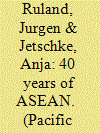

|
|
|
|
|
| Publication |
2008.
|
| Summary/Abstract |
In this introduction, the editors trace the increasing theoretical diversity of ASEAN research and discuss the contributions to this issue against the current state of the art. Contributions confirm the post-Asian crisis advancement of constructivist scholarship, but by also analyzing ASEAN from the Liberal and English school perspectives, the articles assembled in this issue nevertheless stand for theoretical pluralism. This article continues to open a governance perspective and, against this background, attests to ASEAN's marked success in pacifying an erstwhile turbulent world region but also to ASEAN's much more ambiguous record in responding to the new challenges associated with globalization
|
|
|
|
|
|
|
|
|
|
|
|
|
|
|
|
| 2 |
ID:
141737


|
|
|
|
|
| Summary/Abstract |
In recent years, financial cooperation within ASEAN Plus Three (APT) has made significant progress. It has covered bond market development, better access to financing, financial stabilization and capital market harmonization, and several initiatives have resulted in concrete programmes being implemented by the APT member countries (ASEAN states, China, South Korea and Japan). In the context of the changes taking place in the regional dynamic, this paper examines the role and involvement of Indonesian financial authorities towards the development of APT financial regionalism, focusing on issues related to regional liquidity arrangements and regional bond markets. The initial findings indicate that, in considering the potential benefits of warding off future economic shocks, there is a strong intention among Indonesian financial authorities to create a space in their national framework for regional liquidity arrangements. However, the authorities are unenthusiastic about the progress of regional governance on bond markets and, for that reason, are disinclined to transform their national regulatory space as it potentially hampers the Indonesian domestic market.
|
|
|
|
|
|
|
|
|
|
|
|
|
|
|
|
| 3 |
ID:
104428


|
|
|
| 4 |
ID:
120536


|
|
|
|
|
| Publication |
2013.
|
| Summary/Abstract |
Brazilian foreign policy demonstrates an interesting double aspect in the changing global system. Its rhetoric and overt positioning is framed around the idea of Brazil as a value-creating actor, while in reality there are significant value-claiming characteristics at the core of its approach to regional and global affairs.
The key for Brazil is its position as a 'bridge' between the South and the North, which allows its diplomats to establish the country as a critical coalition organizer and ideational leader for southern actors looking for major changes in global governance systems, and a central interlocutor for northern actors trying to cope with pressure from the South. Brazil's ambitions are simple: focusing more on an improved relative position, rather than a complete reformulation of the international system, which serves it well in economic, political and security terms.
To explain this argument the article focuses on Brazilian engagement with Africa and South America, as well as the country's approach to major negotiations such as the WTO's Doha round, the Free Trade Area of the Americas and the evolution of regional governance mechanisms such as the Organization of American States and the recently created Community of Latin American and Caribbean States. The pattern that emerges is one of Brazil working to create a consensus around its position, using its consequent leadership to improve Brazilian leverage in the regional and global arena.
|
|
|
|
|
|
|
|
|
|
|
|
|
|
|
|
| 5 |
ID:
191730
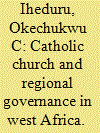

|
|
|
|
|
| Summary/Abstract |
‘Catholic regionalism’ in west Africa exemplifies the capacity of theological claims and theologically informed actors to influence regional governance and international affairs. It is driven by four mutually reinforcing factors: interfaith competition for policy influence and followership, shrinking domestic political space for civil society organizations (CSOs), and de-secularization/counter-secularization pressures (all of which have substantially diminished the church's erstwhile influence); as well as Economic Community of West African States (ECOWAS) reforms granting ‘access’ to CSOs in regional policy. Through a strategy of ‘fateful compromise’ with regional states, the church has, more than its counterparts, developed substantial capacity to influence how regional integration organizations frame and implement policy in Africa. The empirical evidence is derived from fieldwork interviews on the activities of church leaders, namely the bishops represented by the Regional Catholic Episcopal Conference of West Africa (RECOWA); the Catholic bishops’ conferences in Ghana and Nigeria, where interfaith hegemonic competition is most intense; and ECOWAS Commission bureaucrats. The article enriches the ‘new regionalism’ framework with a template to better understand the regional governance activities of Africa's faith-based actors; and contributes to the literature by introducing the concept of ‘fateful compromise’ suggesting multiple trajectories in church-state relations, contrary to the presumption of inevitable ‘elite cooptation’ of social forces as the only option for inclusive or collaborative governance in societies experiencing regression in democracy.
|
|
|
|
|
|
|
|
|
|
|
|
|
|
|
|
| 6 |
ID:
087562
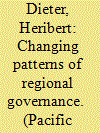

|
|
|
|
|
| Publication |
2009.
|
| Summary/Abstract |
For decades, international relations in the Asia-Pacific were characterized by an emphasis on security affairs. Following the Asian financial crisis of 1997/98, this pattern has changed. In the early 21st century, policy makers in the region put emphasis on the deepening of economic relations. Both in trade and finance, new patterns of governance have emerged. The reasons are manifold. First, traditional security threats are not as important as they used to be. Second, the experience of 1997/98 as well as the current crisis have demonstrated that economic instability is of greater concern than security threats. Third, the economies of the Asia-Pacific are deepening their ties both at the level of production and with regard to investment flows. Despite these structural changes, the level of cooperation continues to be relatively low.
|
|
|
|
|
|
|
|
|
|
|
|
|
|
|
|
| 7 |
ID:
166682


|
|
|
|
|
| Summary/Abstract |
Existing accounts of the US–Cuba Thaw correctly identify the decisiveness of Latin American states in pushing the 2014 change in US policy towards Cuba. Problematically, however, these accounts overlook a range of regional integration projects pursued by Latin American states that prove pivotal in ascertaining the central dynamics of the region in shaping the Thaw. This article argues that these regional integration projects are imperative to understanding how Latin American states were able to alter US policy towards Cuba, for three reasons. First, these initiatives, and Cuba’s role in these projects, are central to understanding why Cuba came to be a unanimously ‘regional’ issue for Latin American states of all political persuasions; second, the challenges to US dominance in the region provided by these integration projects were ultimately what gave Latin American states their teeth in pushing the Obama administration to reconsider its policy towards Cuba; and third, a consideration of this broader regional context more thoroughly illustrates the strategic nature of the change in policy towards Cuba as an attempt by the US to salvage its ability to influence regional affairs in response to these integration initiatives that excluded it from the region’s architecture.
|
|
|
|
|
|
|
|
|
|
|
|
|
|
|
|
| 8 |
ID:
192012
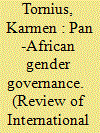

|
|
|
|
|
| Summary/Abstract |
The African Union (AU) has developed an elaborate gender governance architecture, including gender machineries and women’s desks, policy frameworks, path-breaking women’s rights laws, and ongoing campaigns on women’s rights–related issues. At the same time, the member states’ engagement with this architecture is at best lukewarm, with a lack of domestication, compliance, and accountability. This paradox is addressed in this article by developing the theoretical thinking around aspirational politics (Martha Finnemore and Michelle Jurkovich, ‘The politics of aspiration’, International Studies Quarterly, 64:4 [2020], pp. 759–69) and political brokers (Stacie E. Goddard, ‘Brokering change: Networks and entrepreneurs in international politics’, International Theory, 1:2 [2009], pp. 249–81), showing the social and relational origins of pan-African gender governance. In doing so, the article examines how ‘aspirational politics’ can be operationalized to examine the sociocultural and political production of shared future imaginaries. The paper focuses on AU femocrats as the key actors for AU’s aspirational gender agenda and argues for their importance as political brokers between AU member states, donors, UN agencies, and civil society organisations. By mobilizing actors and facilitating common ground and agreement, their institutionalized broker position allowed for various political entrepreneurs to emerge and thrive. At the same time, their pursuits are met with ‘aspirational fatigue’ or outright contestation by the member states. The case of the AU demonstrates how aspirational politics is not a ‘phase’ leading to norms governance but part and parcel of normative negotiation and engagement.
|
|
|
|
|
|
|
|
|
|
|
|
|
|
|
|
| 9 |
ID:
129099


|
|
|
|
|
| Publication |
2014.
|
| Summary/Abstract |
Scalar relations have been restructured in the contemporary capitalism. in post-reform China. many scalars are transformed and constructed with the transition from state socialism to market economy. This article examines the process of rescaling state power from the perspective of politics of scale. using a case of province-jading-city reform in Jiangsu province. By examining the role of government at various levels in the province-leading-city reform. it is argued that the province-leading-city reform is a rescaling of state power. involving up-scaling and down-scaling of powers. Due to power reshuffling in the rescaling process. there are intense power struggles among scalars in both vertical and horizontal dimensions. With the deepening process of globalization. marketization. and decentralization. China's cities and regions have undergone dramatic economic and political restructuring since the late l970s. There emerges consider-
able acidotic and policy interests in China's changing urban and regional governance after the launch of economic reforms and open-door policy. especially after 2000.' On the urban scale. China's changing
governance has been the focus of previous studies? By cautiously borrowing Western urban theories. such as urban regime. growth coalition. and entrepreneurial city. scholars have argued that transitional China shares stone similarities with Western societies, but there are still differences in urban governance due to a strong government or tight social control."
|
|
|
|
|
|
|
|
|
|
|
|
|
|
|
|
| 10 |
ID:
111033
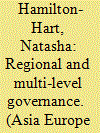

|
|
|
|
|
| Publication |
2012.
|
| Summary/Abstract |
Although the economies of East Asia emerged from the global financial crisis of 2008 in comparatively strong positions, they remain structurally embedded within global markets. The degree of regional integration that has occurred within East Asia is thus predicated on the on-going interdependence with the economies of Europe and North America. Moves to advance East Asian regional cooperation in the wake of the crisis reflect this global interdependence, as well as intra-regional differences in interests and a lack of strong leadership within the region. Modest cooperation on an East Asian basis has continued since 2008 but the region is very far from realising a substantive regional governance model on economic and financial issues and does not appear to be pursuing a distinctive governance agenda. This article examines recent developments in East Asian regional cooperation, with a view to assessing the significance of current achievements and explaining the mixed and sometimes contradictory nature of initiatives for regional governance in East Asia.
|
|
|
|
|
|
|
|
|
|
|
|
|
|
|
|
| 11 |
ID:
191854
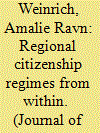

|
|
|
|
|
| Summary/Abstract |
This paper explores the Economic Community of West African States’ (ECOWAS) citizenship regime by investigating the institutional perceptions of five departments of the ECOWAS Commission. Creating a citizenship regime has been a central objective of the organisation's institutional framework but previous research has refrained from examining its multiplicity. The paper uses the concept of citizenship regime consisting of the dimensions rights, access, belonging and responsibility mix as the conceptual lens and draws on institutional documents and primary data from interviews conducted at the ECOWAS Commission. The paper contributes to current debates in citizenship studies and African regionalism and the literature on supra-national citizenship building, regional integration and governance research in Africa and elsewhere. The empirical data show that movement is central to the ECOWAS citizenship regime, whether formulated in terms of a right, as a way to facilitate access, or a way to establish a sense of regional belonging.
|
|
|
|
|
|
|
|
|
|
|
|
|
|
|
|
| 12 |
ID:
094990
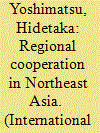

|
|
|
|
|
| Publication |
2010.
|
| Summary/Abstract |
Since the late 1990s, China, Japan, and South Korea - the core states in Northeast Asia - have gradually engaged in various initiatives and institutions for regional cooperation. Such initiatives extend from summitry to functional cooperation in finance, environmental protection, logistics, and other areas. Furthermore, the three countries have shown their willingness to vitalize cross-border economic activities by concluding commercial arrangements. Given these evolutions, this article seeks to address the following questions: what features are found in trilateral cooperative initiatives and how these features are evaluated in terms of 'regional governance'? The paper advances two propositions. First, regional cooperation in Northeast Asia can be characterized as weak neoliberal orientation and intensive business involvements in cooperative projects in state-directed policy networks. Second, regional governance in Northeast Asia has gradually intensified the nature of regulatory governance in which the governments of the three countries sought to harmonize standards and regulatory systems through trilateral cooperation.
|
|
|
|
|
|
|
|
|
|
|
|
|
|
|
|
| 13 |
ID:
157932
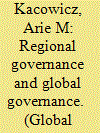

|
|
|
|
|
| Summary/Abstract |
This article examines the possible links between regional governance and global governance from a regional perspective. It presents and develops a typology of linkages that include: (1) irrelevance; (2) conflict; (3) cooperation; and (4) harmonic relations. Moreover, it suggests three alternative explanations to make sense of the linkages as a function of the nature of the issue area of regional and global governance, the role of pivotal states, and the importance of ideational factors and the diffusion of norms. It succinctly refers to the Latin American experience as an illustration of the nexus between regional governance and global governance in a comparative perspective.
|
|
|
|
|
|
|
|
|
|
|
|
|
|
|
|
| 14 |
ID:
140270
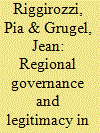

|
|
|
|
|
| Summary/Abstract |
Over the last decade, rapid changes to development models and market rules have led—yet again—to a revision of the meaning of regionalism, bringing to the fore the role of regional organizations in anchoring democracy and supporting progressive social policies. This is particularly the case in South America, where the presence of regional organizations in public policy-making is a subject of increasing scrutiny. This article examines new forms of politically sensitive regional governance in South America, focusing in particular on the case of the Union of South American Nations (UNASUR). It shows how contemporary South American regionalism bypasses the questions of trade and investment that dominated earlier schemes of regionalism in order to focus on shoring up democracy and managing the regional social deficit. The article explores UNASUR's actions in two policy areas: supporting the regional democratic norm and health policy. UNASUR, this article argues, is developing a hybrid form of output-focused legitimacy that rests on a combination of credible commitments to welfare promotion, especially for the poor, and the pursuit of collective public goods, alongside a robust defence of quite minimal but uncontroversial standards of procedural democracy across the region. The analysis challenges the view that regionalism has failed in South America and identifies instead the emergence of a new sort of highly political regionalism. We call for UNASUR to be taken more seriously in the literature on comparative regionalism and, indeed, for a revision of how regionalism more widely is understood in Latin America.
|
|
|
|
|
|
|
|
|
|
|
|
|
|
|
|
| 15 |
ID:
092667
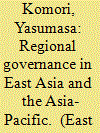

|
|
|
| 16 |
ID:
095884
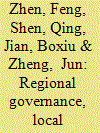

|
|
|
|
|
| Publication |
2010.
|
| Summary/Abstract |
Although the current practice of administrative division adjustment in China may help to facilitate regional governance and urbanization economies, it does not effectively resolve the fundamental conflicts between the central city and surrounding county-level cities.
|
|
|
|
|
|
|
|
|
|
|
|
|
|
|
|
| 17 |
ID:
103903
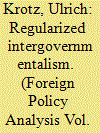

|
|
|
|
|
| Publication |
2010.
|
| Summary/Abstract |
Regularized intergovernmentalism refers to a distinct kind of foreign policy practice that connects and intertwines foreign policy processes in particular ways. This paper puts forth a concept to properly capture and expose such distinctive foreign policy realities characterizing certain periods and places. With this concept, the article systematically scrutinizes the intergovernmental fabric of bilateral Franco-German relations from 1963 to 2009. The characteristic features of Franco-German regularized intergovernmentalism represent a crucial foreign policy connection, foundational for European affairs of the past half century and a defining feature of Europe's post-war order and regional governance. Exploring key aspects of what it is that links France and Germany in particular ways, this paper offers a historically deeply grounded constitutive analysis. Based on its constitutive inquiries, the papers points at new possibilities of causal theorizing and explores some of regularized intergovernmentalism's hypothesized effects and limitations. Franco-German intergovernmental affairs may be the most developed instance of this practice. But regularized bilateral intergovernmentalism is not a Franco-German idiosyncrasy. Rather, it is an important and apparently growing approach to structuring foreign policy conduct, and seems an increasingly prominent aspect of how the world is organized.
|
|
|
|
|
|
|
|
|
|
|
|
|
|
|
|
| 18 |
ID:
186107


|
|
|
|
|
| Summary/Abstract |
ASEAN member states have invested substantially in cooperation on humanitarian assistance and disaster relief (HADR). Despite broad support for the idea of ‘localizing’ HADR governance, the rise of regional agency has in practice led to uncertainty and frictions between humanitarian stakeholders. The article makes sense of these tensions by investigating the narratives through which intra- and extraregional agents construct the role of the ASEAN Coordinating Centre for Humanitarian Assistance on Disaster Management (AHA Centre). Based on the assumption that narratives are central legitimating practices when new agents enter a governance arena, it analyzes textual material produced by different humanitarian organizations that operate in Southeast Asia, as well as interviews with representatives from these organizations. Their accounts of the AHA Centre’s role can be grouped into four narratives that are bound up with competing ideas about regional humanitarian order: an affirmative one, a skeptical one, a critical one and a transformative one. The article thus rejects characterizations of regional HADR as a rationally designed ‘architecture’ and instead defines it as a deeply political arena where different conceptions of order are asserted, contested and negotiated.
|
|
|
|
|
|
|
|
|
|
|
|
|
|
|
|
| 19 |
ID:
110512
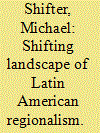

|
|
|
|
|
| Publication |
2012.
|
| Summary/Abstract |
"Brazil's rise, coupled with the diminished influence of the United States and the increasingly salient global role of China, has reshuffled the kaleidoscope of regional organizations. . . ."
|
|
|
|
|
|
|
|
|
|
|
|
|
|
|
|
| 20 |
ID:
120467
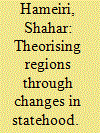

|
|
|
|
|
| Publication |
2013.
|
| Summary/Abstract |
The study of regionalism is often characterised as too fragmented, plagued by disagreements over such fundamental matters as its ontological and epistemological premises, which also hinder efforts at substantive comparison of regionalisation processes. In this article it is argued that to overcome these problems, what is required is a more rigorous incorporation of such studies within relevant work in state theory and political geography. The key insight herein is that regionalism should not be studied separately from the state as these are interrelated phenomena. State-making and regionalisation are both manifestations of contested political projects aimed at shaping the territorial, institutional, and/or functional scope of political rule. Furthermore, the article also distils the lines of a mechanismic methodology for comparative regionalism. Its main advantage is in overcoming the implicit benchmarking of regional development we find in other approaches. The framework's utility is then demonstrated through a comparison of regional governance in Asia and Europe.
|
|
|
|
|
|
|
|
|
|
|
|
|
|
|
|
|
|
|
|
|